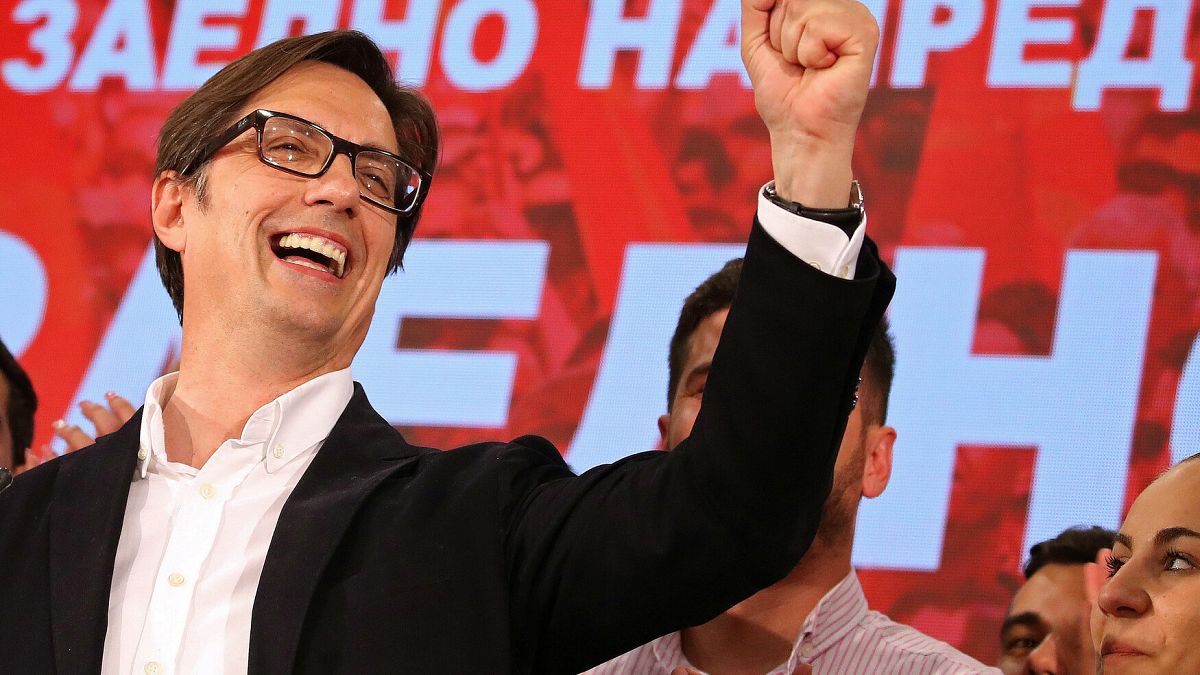What’s next for North Macedonia? Euronews Answers what lies ahead for the Republic of North Macedonia which elected a pro-European president on Sunday.
Pro-Western candidate Stevo Pendarovski won the presidency in North Macedonia on Sunday in an election that many described as a referendum on the Balkan republic’s recent name change.
Pendarovski defeated nationalist candidate and university professor Gordana Siljanovska-Davkova.
Pendarovski supports North Macedonia’s June 2018 agreement with Greece to change its name from the Republic of Macedonia to the Republic of North Macedonia after a long dispute over the term “Macedonia.” Greece has a province that borders North Macedonia called Macedonia.
Voter turnout in North Macedonia was low at roughly 46.7 percent, according to the election commission website, which is just above the 40 percent threshold for the vote to be valid. Government-backed candidate Pendarovski had received roughly 436,000 votes as of Monday out of 1.8 million eligible voters.
The newly elected president’s support for the agreement will help North Macedonia move ahead in accession to the European Union and NATO, experts say.
Euronews looks at what is next for the republic.
Is this election a ticket to the European Union?
Although North Macedonia was given EU candidate status as early as 2005, the republic did not join either the EU or NATO after Greece blocked its adhesion to either group due to the naming dispute.
But the prospects for EU and NATO membership changed after North Macedonia, previously referred to as the Former Yugoslav Republic of Macedonia agreed to change its name to the Republic of North Macedonia in a June 2018 agreement with Greece that went into effect in February.
The presidential election “sealed the Prespa agreement with Greece,” Borjan Jovanovski, editor-in-chief of the Macedonian news site NOVA TV, told Good Morning Europe. It shows that “North Macedonia is ready… to implement fully this agreement with Greece,” and that the country is “expecting a green light to start the membership talks with the EU.”
“The result from this presidential election means the guaranteed move as a country for membership of NATO and the EU, together with economic development in a world where we belong,” the newly elected Pendarovski declared in his victory speech on Sunday.
What happens next for North Macedonia?
Although a “win for the pro-European, pro-NATO and pro-reform social democrat coalition,” Janovski told Euronews, the election leaves a “bitter taste” since the “nationalist, populist” candidate received over 370,000 votes. It shows that the government has lost some support “only two years after the parliamentary election,” Janovski said.
“I hope triumphalism will not rule… and I know one thing, with this, all the problems of Macedonia will not be resolved,” opposing candidate Siljanovska-Davkova said as she conceded the election.
But the Prespa agreement has already had an impact on North Macedonia’s international standing. After the agreement was decided, NATO formally invited the country to begin accession talks to join NATO. Once the protocol is ratified by all 29 allies, the country will be NATO's 30th member.
Experts say this expansion of NATO will limit Russian influence in the Western Balkans.
EU accession will be a much longer process.
What’s been the reaction from Greece on the election?
Euronews’ correspondent Fay Doulgkeri reports from Athens that the Greek government is “satisfied” with the outcome of the election due to Pendarovski’s support of the Prespa agreement.
Members of the Greek government have been touring Greece to convince Greek people that the Prespa agreement is beneficial, Doulgkeri reports. But even as the Greek government ratified the Prespa agreement, early polling suggested that a majority of Greek people did not support the compromise.
Though the role of president in North Macedonia is largely ceremonial, the Greek government would not want a challenge to the Prespa agreement ahead of the European and general elections, Doulgkeri told Good Morning Europe. Greek general elections will take place in October 2019.
There is not yet an official statement from the Greek government, but the alternate foreign minister of Greece, Sia Anagnostopoulou, tweeted Monday, “North Macedonia ended its nationalistic past with VMRO. After the Prespa Agreement, our neighbours show that they determined to move forward, breaking all the nationalist obstacles."
Watch the full report in the player above
